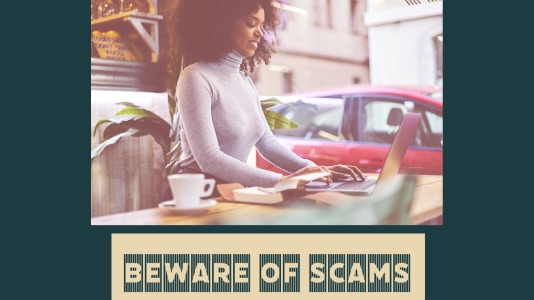Scams are on the rise! There are phone scams, email scams, romance scams, employment scams, charity scams and many others. About 59.4 million Americans have lost nearly $30 billion dollars in phone scams alone. So you have to be diligent to protect yourself from scams.
The other day a friend of mine sent me an email. There was a casual question in the beginning, but then it took a turn. Check it out for yourself.
Actual Email Received
Email subject line: “Are you Around Today?”.
When I opened the email, here’s what I saw:
How are you doing? I was wondering if I can get a quick favor from you.
Awaiting your response,
Thanks…..(my friend’s first and last name)
At first glance, I thought it was a little suspicious considering the sender had never asked me for anything since I met him 20+ years ago. I sent back a short and kind reply.
Then I noticed the same exact email was sent to another one of my email addresses from him. That caught my attention immediately and I became suspicious. Like Spider-Man would probably say, “My Spidey Sense was on full alert.”
Not long after my reply, I received this response:
Good to hear from you, am trying to get a Amazon E-gift card for my Friend who is diagnosed with stage 4 mesothelioma cancer but I don’t know what’s wrong with my amazon account it’s not going through and have called Amazon, but it has not been resolved yet, can you please help me purchase a Amazon E-gift card over there from your amazon account. Let me know if you could handle that so I can send you her email so the E-Gift can be sent there and I am only looking to spend $200 on it, I will refund you back as soon as possible.
Await your soonest response
Thanks…… (my friend’s first and last name)
At this point, I knew it was a scam and contacted my friend to inform him about what happened. I quickly found out, I wasn’t the first one who had called him about it. But I was the only one to help him do something about it with his email account.
How to Spot-a-Scam:
- There’s a sense of urgency with a request: As you can see the scammer had a sense of urgency in both emails. The scammer went from signing off “Awaiting your response” to “Await your soonest response.”
- They want something of monetary value or your personal information: In this case it’s clear, they’d like me to buy a $200 Amazon gift card. Beware of scams that ask you to go and buy gift cards, make a money transfer or provide any of your account/personal information for any type of verification.
- Emotional tug – In this case, the writer wants me to have some empathy for a stage 4 cancer friend who he’d like to gift a $200 Amazon card at my expense. Sometimes they try to appeal to you with fear or loss if you don’t take action also.
Thankfully, I spotted the scam and avoided being taken for a $200 Amazon gift card.
Scams are an ongoing problem today. On Black Friday I received the fake scam email about my Amazon Account being Locked. (I know, so many Amazon scams – right?) But I’ve also received the Apple support and PayPal scam emails and calls.
Even my mom has received employment phone call scams about a job offer she never applied for. And one time someone called her saying her grandson (without a name they could provide) needed her to hurry and go to the grocery store to buy a $500 gift card to help him. She doesn’t go for any of these scams. But the calls never stop.
Protect Yourself from Scams
Thank goodness for callerid and call block! They come in handy in protecting yourself from scammers.
You still have to be very diligent to avoid getting scammed these days. Stay informed and beware of scams to help protect yourself.
Don’t be a victim of scammers! Read the FTC’s “How to Avoid a Scam” for more information to help you spot scams and avoid them.
Check out the the IRS’s video below to find out how to recognize a scam and what you can do to avoid it.
Last, but not least, when it comes to some scams always remember what Chester the Banker once told me. He said, “If it sounds too good to be true – it ain’t!”



